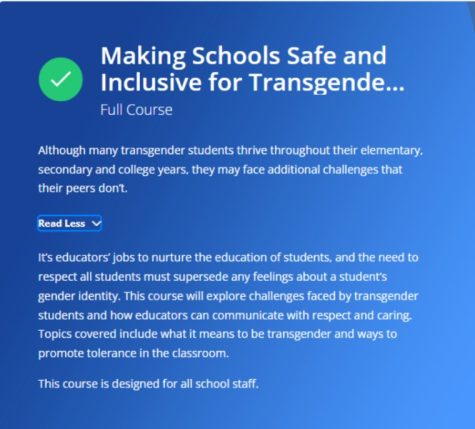Suffering in Silence: The Plight of Trans & Non-Binary Students
Despite words of support from administrators, some students can’t help feeling unsafe at school
April 2, 2023
Most of us who are privileged enough to have access to education spend at least 12 years of our lives in school. It’s the place where we make friends, explore our passions, and discover ourselves. Our entire personalities are developed and cemented during our childhood. But what happens when you are afraid to show who you truly are?
The reality for many queer students at Hunterdon Central Regional High School – and most high schools – is a bleak one. They are forced to hide their identities from their teachers, peers, and sometimes even their own families. If they do come out, they are subjected to bullying and discrimination just for being who they are.
In particular, transgender students face extraordinary barriers that others probably don’t even realize exist. Despite the administration’s claimed efforts to foster an inclusive environment, many trans students still do not feel safe at school, the very place that is supposed to support them.
One trans student, who wishes to remain anonymous, described a traumatic experience while using the men’s bathroom in the IMC. “When I went to go open the stall, a bunch of guys swarmed the bathroom… I was getting really anxious, so I thought I would just wait for them to leave, but they never did,” they said. “They started banging on the doors, telling me to get the f*ck out. Kids were jumping over the stall and taking pictures… when I finally walked out, you could hear all the boys telling their friends some weird trans kid was hogging the bathroom, and they were using slurs.”
The student decided not to report the incident to the school, in part because they feared no action would be taken.
Even if they don’t experience an outright act of harassment, queer students at Hunterdon Central have long felt excluded in their classes simply due to the use of language. Unfortunately, gendered language is commonplace in our society, such as using “she/he” in writing instead of “they” and calling people “ma’am” or “sir” based on an assumption of one’s gender.
Trans people often have to deal with others assuming their gender based on their hair, clothes, facial shape, voice, or other physical attributes, when in reality, you cannot tell someone’s gender identity just by looking at them.
The constant use of gendered language excludes and marginalizes trans and non-binary students, who often don’t identify as a binary gender of either male or female.
Sam Smith (he/him) is a 9th-grade student who has been directly harmed by these comments. “Teachers say ‘ladies and gentlemen’ a lot,” he said. “They don’t realize it’s offensive.”
To make matters worse, trans students at Central, especially non-binary and gender non-conforming students, often don’t even have access to appropriate bathrooms, something cisgender people take for granted.
Mr. Edward Brandt, principal of Hunterdon Central Regional High School, noticed a frightening trend. “Some students were going to the nurse just to go to the bathroom every day,” he said.
As a result, two gender-neutral bathrooms were created during the 2020-2021 school year. But two bathrooms in a school with five classroom buildings is far from enough.
Mr. Brandt cited staffing issues as a main factor. “There is a limited number of staff members who can work the lavatory, or study hall, or those types of duties,” he said.
Even so, the school somehow manages to staff at least eight gendered bathrooms every single day.
For most students, using the gender-neutral bathrooms would mean a long walk of up to 5 minutes if coming from a class on the very opposite side of the building. This causes them to miss class time and have to catch up on work. Teachers often get irritated when students are out of class for too long, making using the bathroom in these instances almost impossible.
According to Alpha (they/them), a senior who identifies as polygender, the buildings are too large to allow proper use of the bathrooms. “One in each building is not enough,” they said.
Before school, after school, and during passing time between classes (which is often the only time students can use the bathroom without having to miss important classwork), the limited gender-neutral bathrooms remain locked and inaccessible. Students in the music/communications building, Polytech building, and IMC (despite being recently renovated) don’t have access to any gender-neutral bathrooms at all.
Meanwhile, the locker rooms at Hunterdon Central are even worse off – there is not a single gender-neutral locker room in a school serving almost 3000 students. If you’re transgender or nonbinary and don’t feel comfortable changing in the binary locker rooms, you have only two options: be singled out by going to the nurse and changing, or sit in the gym and not have the chance to change at all.
Besides facing barriers to basic necessities such as using the bathroom or changing, trans students also face discrimination in their classes, the core part of their school experience. Teachers consistently misgender (use the wrong pronouns for) and deadname (use the wrong name for) students. Microaggressions are commonplace.
Chris Raposo (they/it) is a senior who identifies as non-binary but is often misgendered. “My math teacher called me a ‘smart guy’, and somebody else called me ‘bro’,” they said.
These acts of misgendering are not always due to ill intent (though sometimes they are). The truth is that teachers, other staff, and students alike just don’t have adequate training on how to use gender-inclusive language.
Hunterdon Central Regional High School requires teachers to go through online modules on topics such as supporting queer students (especially trans students) and diversity, equity, and inclusion.
But Dr. Lindsay Warren (she/they), who has been teaching social studies there for 16 years, feels the new training modules are far from enough. “They’re not robust,” she said. “You can click through them easily, and you don’t have to pay attention.”

When teachers are not adequately trained, students will suffer. But it’s not just teachers who lack the knowledge necessary to support their students. Other staff at schools, such as cafeteria workers, counselors, custodians, administrators, secretaries, maintenance staff, bus drivers, and more, must also be provided with comprehensive training on the topic.
Alpha has experienced their fair share of harm in just the short time that they ride the bus each morning. They say that their bus driver is very vocally unsupportive of queer students. “They don’t want to make any effort to accommodate us,” they said. “It makes me so upset, and it makes me not want to sit on the bus.”
While Hunterdon Central does have training for staff on topics such as supporting queer students, it has proved ineffective. Students are still experiencing acts of misgendering and discrimination on a daily basis, despite the use of training modules.
Students at Hunterdon Central are suffering in a place that is supposed to support them. Unfortunately, queer and trans students across the country are also being subjected to the same kind of discrimination.
